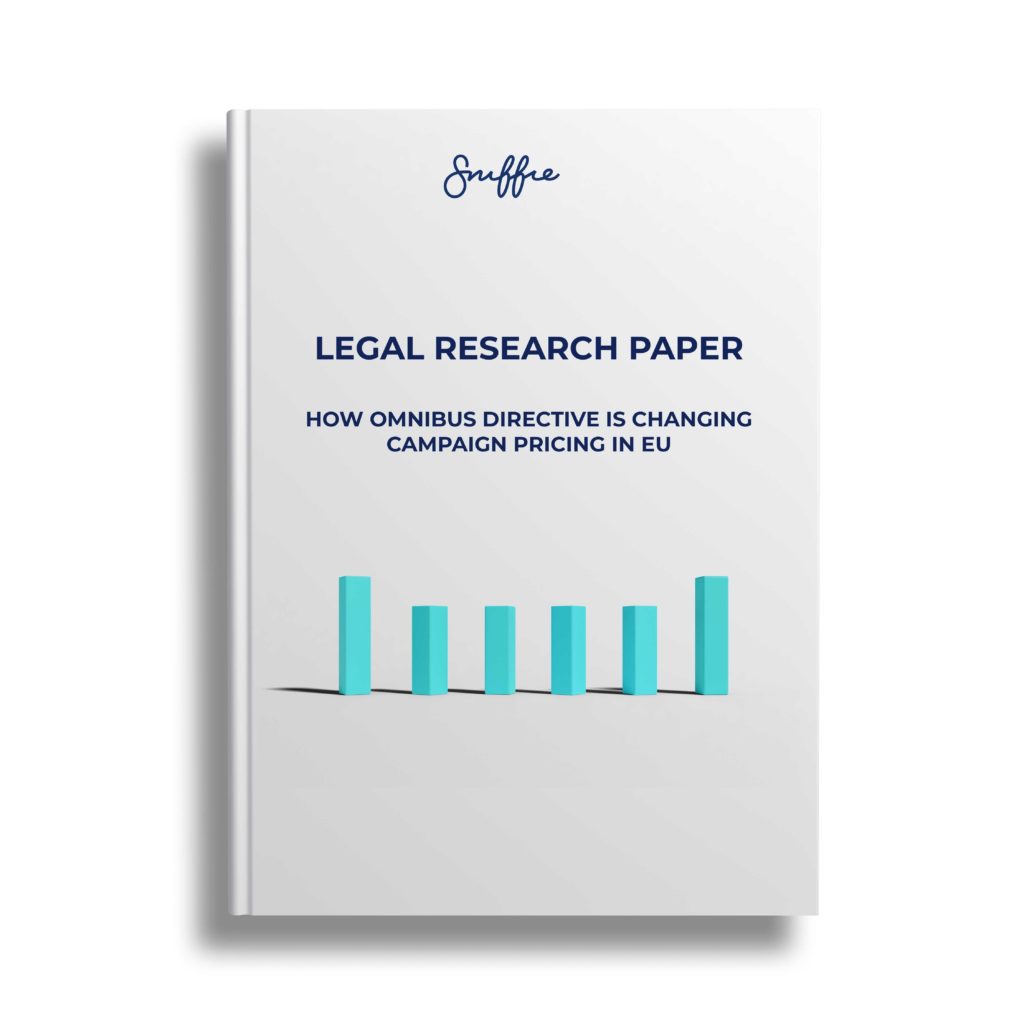What is the so-called “Omnibus directive” you ask? Enforcement and Modernisation directive 2019/2161 (better known as Omnibus directive) is an EU directive that aims to reinforce consumer rights via enforcement measures and increased transparency requirements. The main aim of the omnibus directive is to enhance the protection of consumer rights across the European Union.
The changes that come with the directive affect significantly the following elements of retail and e-commerce:
- Information regarding price reductions (discounts) have to be more transparent.
- Seller information has to be extended, customers have to know who they are actually buying from.
- Fake customer reviews or endorsement are prohibited, all customer reviews have to be authentic.
- Retailers have to inform customers about the use of methods of providing customers with personalised prices as a result of automated decision-making and consumer profiles such as price optimization algorithms.
What does the Omnibus directive mean for retailers in the EU?
No matter if you’re running an online store or if you operate out of a traditional brick and mortar store if you operate within the EU and apply discounts on your products this directive will have an impact on how you have to inform consumers about your pricing. Retailers are required to inform consumers with not only the discounted price or the discount percentage of a product but also the previous price the product has had on sale within the past 30 days. A common strategy for businesses has been to increase the prices of their products before the start of a holiday season to offer “discounted” prices during a common sales season such as Single’s Day or Cyber Monday. The omnibus directive eliminates the use of the mentioned strategy.
This directive however, does not apply to all merchandise and discount campaigns out there. Quickly perishable merchandise and discount campaigns that are limited to specific consumers such as loyal customers are not affected by the omnibus directive.
Read the complete story
Is the Omnibus directive something that you would like to learn more about? For European retail / merchants operators preparation is the key for tackling the implications that the directive will have on running pricing campaigns on a web or brick and mortars store. Download our free eBook to brief yourself into the topic!

What happens if a retailer fails to comply with the Omnibus directive?
Businesses should not take the changes that come with the directive lightly. If a retailer gets caught on failing to comply with the directive, they can be fined up to 4% of the retailer’s annual turnover in the Member State (or Member States) where the breach occurred, or €2 million in cases where information on turnover is not available. Let’s assume you’re running a website that sells fast fashion. The turnover of your company is $550,000 and you get caught posting fake customer reviews on your website and you have not provided your customers with the information of latest sales prices of your products during the past 30 days. As a result of this scenario your company gets fined and the amount of the fine is 4% of your turnover. In this case the actual amount of fine in dollars would be $22,000.
When do you need to apply this to your pricing
If you’re running a B2C online business (selling products directly to consumers) within the EU and you change the prices of your products for example in the form of a sales campaign this directive applies to you, your business, and to the way you have to inform your customers about your prices. As a simple example let’s imagine that we’re once again running an ecommerce business that sells fast fashion online within the EU. You’ve decided to put jeans and hoodies on sale, the omnibus-directive now requires you to inform consumers with the discount % or the € amount of the discount on the product but also the lowest price these products have been sold with to consumers within the last 30 day.
When will the Omnibus directive be set in motion and how can you prepare for it?
The Omnibus directive already came into force in 2020, on the 7th of January to be exact. Last year, in 2021 the EU member states had till the 28th of November to publish on how they will implement the legislation. The laws following the directive will come into force on the 28th of May 2022.
Firstly just like with GDPR you as a business owner should understand exactly how this new directive will affect your business. Will it have an effect on your business as a whole or only on a part of your business? Will it affect all of your products or just some of your products? Increase transparency in your store, get rid of fake customer reviews, inform customers about the discounted prices of your products, and let customers know if they are being offered a personalised price that is for example based on an algorithm.
Secondly, explore the possibilities that a company like Sniffie can do for your pricing. Our AI-based price optimisation keeps your prices on an optimal level 24/7 and makes it really easy to obtain and share transparent pricing information to your customers.
How are we at Sniffie going to implement this to our pricing automation?
Our pricing tool will not set lower prices for your products if we don’t have the historical data of your prices from the previous 30 days.
Our tool already collects each price point of your products every day which makes it quick and simple to confirm the lowest price. With a working integration you can easily import both the lowest price of a product during the last 30 days and the new discounted price to your store. In case there is no working integration (this all depends on how each ecommerce platform tweak their integrations regarding the directive) we can provide you with the information of the lowest prices your products have had during the past 30 the days in the UI of our tool. In the latter case it is the customers responsibility to set the lowest price on the ecommerce platform that they use. As an end result for either of the cases you will get the information regarding the lowest price of a certain product during the past 30 days easily with the use of our tool.
Our approach to the Omnibus directive
We are ready for Omnibus directive compliant pricing campaigns. This blog post studies how we solve this issue automatically for our current and upcoming Ecommerce pricing customers.

We can help, get to know us
The changes that come with the omnibus directive are going to change the transparency of pricing in ecommerce and pose some challenges. We’re happy to help, get to know us and our services. You can also always contact us if you have any questions regarding your ecommerce pricing!



